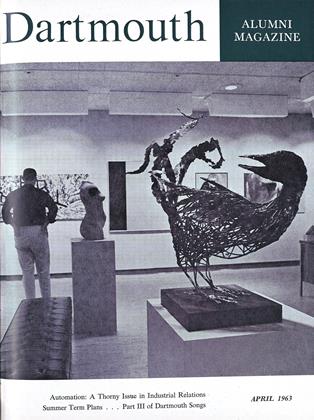DARTMOUTH'S Thayer School of Engineering next fall will inaugurate programs leading to the degrees of Master of Engineering and Doctor of Engineering. This will increase to three the number of fields in which the College will be offering the doctoral degree. The Trustees earlier approved doctoral-level programs in mathematics and molecular biology, both of which were introduced last fall.
Dean Myron Tribus of Thayer School pointed out that the new program is the logical extension of the educational philosophy that has governed the engineering school since its founding in 1871: If an engineer is to apply science to satisfy human needs, he must have not only the scientific skills but also the broad liberal arts background that develops the human skills. The program will emphasize a professional approach to engineering, as well as scientific and technical competence. Both of the new degrees will require the candidate to demonstrate creative ability to design engineering works within a limited budget and on a tight schedule.
Dean Tribus added, "This is Dartmouth's response to the need expressed by President Kennedy's Science Advisory Committee under Jerome B. Wiesner, who stated, 'Engineering students should be better prepared for practice in creative design.' We agree. Science alone is not enough. An engineer is not a scientist minus something; an engineer is a man who has mastered the sciences and gone on to learn how to apply them within an economic framework with professional attention to the managerial and practical considerations. We hope in this program to make the Thayer School a pilot plant for modern engineering education."
Thayer School last year received a grant of $1,000,000 from the Alfred P. Sloan Foundation to help support the program.
Dartmouth's undergraduate engineering program was reorganized in 1958, drawing on the resources of strong offerings in mathematics, physics, and chemistry. The courses have emphasized economical design at all levels as basic to the successful practice of engineering.
The advanced master's and doctoral-degree programs will admit students who have majored in a broader range of undergraduate fields than previously, Dean Tribus said. In addition to the engineering science major, students' primary fields before entering Thayer School may have been physics, mathematics, chemistry, or government.
A student's normal progress would allow him to earn the A.B. degree in four years, the bachelor of engineering in five, the master of engineering in six to seven. The doctor of engineering degree will usually require an additional year or two.
 View Full Issue
View Full Issue
More From This Issue
-
 Feature
FeatureDARTMOUTH SONGS
April 1963 By HAROLD F. BRAMAN '21 -
 Feature
FeatureAUTOMATION: Progress vs. Problem
April 1963 By CLYDE E. DANKERT. -
 Feature
FeatureSummer Term Close to Count-Down
April 1963 By R.J.B. -
 Feature
FeatureDartmouth in the Public Service
April 1963 -
 Class Notes
Class Notes1922
April 1963 By LEONARD E. MORRISSEY, CARTER H. HOYT -
 Article
ArticleTHE UNDERGRADUATE CHAIR
April 1963 By CARL MAVES '63
Article
-
 Article
ArticleS. A. T. C. CONTRACTS AND THE COLLEGES
October 1919 -
 Article
ArticleDEMOLISHING A BUILDING ON THE CAMPUS
May 1929 -
 Article
ArticleReunion Schedule
January 1949 -
 Article
ArticleDr. Wheelock's Journal
June 1993 By "E. Wheelock" -
 Article
ArticleTHE ARCHITECTURE OF DARTMOUTH
March 1925 By J. Frederick Larson -
 Article
ArticleMedical School
December 1953 By ROLF C. SYVERTSEN '18

